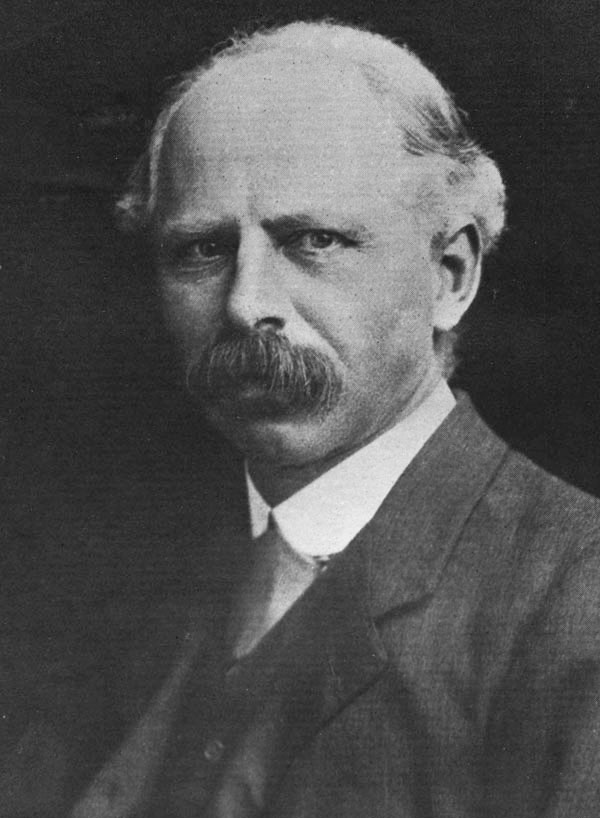“If the child was helpless, was the grown up person, man or woman, in a much better position?”
Fonte: Liberalism (1911), Chapter IV, "Laissez - Faire", p. 46.
Leonard Trelawny Hobhouse foi um académico e um político liberal britânico. Foi um dos teóricos do novo liberalismo juntamente com Thomas Hill Green. Foi o primeiro professor de sociologia de uma universidade britânica em Oxford e mais tarde na University of London . Foi também um jornalista. Secretário da Free Trade Union , escreve no Manchester Guardian e em Tribune , aqui como editor político. Rejeita o laissez-faire, mas também se distancia dos fabianos, acusando-se de cederem ao burocratismo.
Ernest Gellner apreciava a sua inteligência e racionalidade e terá dito sobre Hobhouse: "O racionalismo parece ter-lhe saído fumegando pelas orelhas" [carece de fontes?]
Wikipedia

“If the child was helpless, was the grown up person, man or woman, in a much better position?”
Fonte: Liberalism (1911), Chapter IV, "Laissez - Faire", p. 46.
Fonte: Liberalism (1911), Chapter VIII, Economic Liberalism, p. 89.
Fonte: Liberalism (1911), Chapter IV, "Laissez - Faire", p. 50.
Fonte: Liberalism (1911), Chapter VI, The Heart Of Liberalism, p. 69.
Fonte: Liberalism (1911), Chapter V, Gladstone And Mill, p. 56 .
Fonte: Liberalism (1911), Chapter IX, The Future Of Liberalism, p. 118.
“Great changes are not caused by ideas alone; but they are not effected without ideas.”
Fonte: Liberalism (1911), Chapter III, The Movement Of Theory, p. 30.
“We need less of the fanatics of sectarianism and more of the unifying mind.”
Fonte: Liberalism (1911), Chapter IX, The Future Of Liberalism, p. 126-127.
Fonte: Liberalism (1911), Chapter II, The Elements of Liberalism, p. 17.
“Government must keep the ring, and leave it for individuals to play the game.”
Fonte: Liberalism (1911), Chapter III, The Movement Of Theory, p. 34 .
Fonte: Liberalism (1911), Chapter I, Before Liberalism, p. 9.
Fonte: Liberalism (1911), Chapter V, Gladstone And Mill, p. 60.
Fonte: Liberalism (1911), Chapter IX, The Future Of Liberalism, p. 117.
Fonte: Liberalism (1911), Chapter II, The Elements of Liberalism, p. 17.
“In modern industry there is very little that the individual can do by his unaided efforts.”
Fonte: Liberalism (1911), Chapter VIII, Economic Liberalism, p. 99.
“The foundation of liberty is the idea of growth.”
Fonte: Liberalism (1911), Chapter VI, The Heart Of Liberalism, p. 66.
Fonte: Liberalism (1911), Chapter IV, "Laissez - Faire", p. 47.
Fonte: Liberalism (1911), Chapter I, Before Liberalism, p. 9.
Fonte: Liberalism (1911), Chapter VIII, Economic Liberalism, p. 97.
Fonte: Liberalism (1911), Chapter VI, The Heart Of Liberalism, p. 63.
Fonte: Liberalism (1911), Chapter III, The Movement Of Theory, p. 30.
Fonte: Liberalism (1911), Chapter II, The Elements of Liberalism, p. 16.
Fonte: Liberalism (1911), Chapter III, The Movement Of Theory, p. 34.
“Does scope for individual development, for example, consort with idea of equality?”
Fonte: Liberalism (1911), Chapter VII, The State And The Individual, p. 74 .